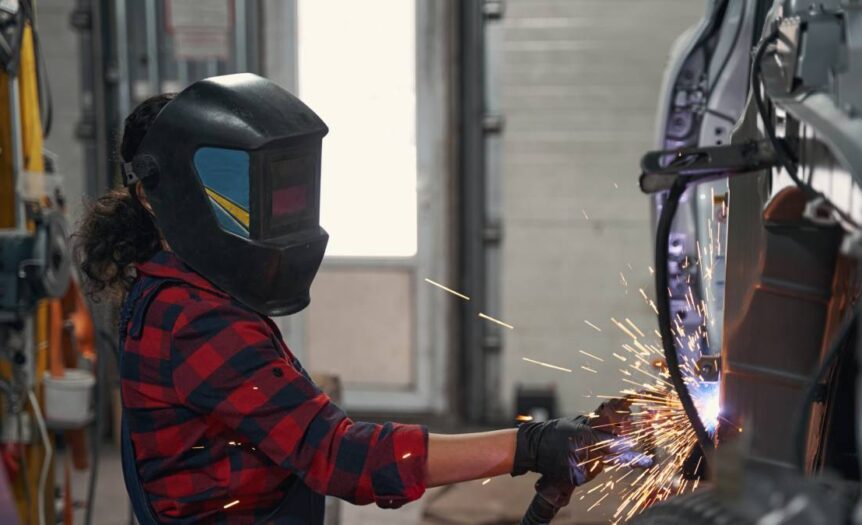Embarking on a welding career can be a rewarding journey filled with opportunities for growth and specialization. Welding is a skilled trade that combines both technical knowledge and hands-on expertise, making it a critical component of many industries, from construction to aerospace. Whether you’re just beginning to explore this path or have already committed to becoming a welder, proper preparation is key to success. Let’s look at four steps to a successful start to your welding career and preparation that can set you apart from the competition.
Develop a Solid Foundation of Knowledge
Welding requires both practical skills and theoretical knowledge, so you need to educate yourself on the fundamentals before diving into hands-on experience. This means familiarizing yourself with different welding techniques, materials, and safety protocols. Consider enrolling in a welding program at a technical school or community college to gain a strong foundation in this trade. These programs often include coursework in blueprint reading, metallurgy, and math to help you understand the underlying principles of welding.
Knowing the best welding process for manufacturing and fabrication applications is essential to your success. Take the time to research and understand different welding methods, such as MIG, TIG, and stick welding, and the applications best suited for each. This knowledge will make you a better welder and improve your employability.
Gain Hands-On Experience
While theoretical knowledge is crucial, hands-on experience is equally important in the welding trade. Find opportunities to practice welding techniques under the guidance of an experienced welder or through an apprenticeship program. Many vocational schools offer internships or externships with local businesses that allow students to apply their skills in a real-world setting.
Additionally, consider joining a welding club or organization where you can network with other welders, attend workshops or conferences, and get hands-on experience in a supportive environment. The more practice you have, the more confident and skilled you will become as a welder.
Invest in Quality Equipment
As with any trade, having the right tools is vital to success. As you progress in your welding career, invest in quality equipment that meets industry standards and safety regulations. This includes protective gear, such as gloves, helmets, and jackets, as well as machinery like welding machines and cutting torches. Investing in quality equipment will improve your efficiency and productivity as a welder and show potential employers that you’re serious about your career.
Develop Soft Skills
While technical skills are essential for welding, don’t overlook the importance of soft skills. These include communication, teamwork, problem-solving, and time management. Welders often work in teams and must be able to communicate effectively with co-workers and supervisors. They also need strong problem-solving abilities to troubleshoot issues that may arise during a project.
Additionally, time management is critical in meeting deadlines and completing projects efficiently. Developing these soft skills will make you a more well-rounded welder and increase your value as an employee.
By following these four steps, you can lay a solid foundation for a successful welding career. Remember to continue learning and honing your skills throughout your career to stay current with industry advancements and remain competitive in the job market. With dedication and hard work, you can build a fulfilling and lucrative career as a welder.










 Deering Estate
Deering Estate
 Massage Envy South Miami
Massage Envy South Miami
 Calla Blow Dry
Calla Blow Dry
 My Derma Clinic
My Derma Clinic
 Sushi Maki
Sushi Maki
 Sports Grill
Sports Grill
 The Healthy Kitchen
The Healthy Kitchen
 Golden Rule Seafood
Golden Rule Seafood
 Malanga Cuban Café
Malanga Cuban Café

 Kathleen Ballard
Kathleen Ballard
 Panter, Panter & Sampedro
Panter, Panter & Sampedro
 Vintage Liquors
Vintage Liquors
 The Dog from Ipanema
The Dog from Ipanema
 Rubinstein Family Chiropractic
Rubinstein Family Chiropractic
 Your Pet’s Best
Your Pet’s Best
 Indigo Republic
Indigo Republic




 ATR Luxury Homes
ATR Luxury Homes


 2112 Design Studio
2112 Design Studio
 Hamilton Fox & Company
Hamilton Fox & Company
 Creative Design Services
Creative Design Services
 Best Pest Professionals
Best Pest Professionals
 HD Tree Services
HD Tree Services
 Trinity Air Conditioning Company
Trinity Air Conditioning Company
 Cisca Construction & Development
Cisca Construction & Development
 Mosquito Joe
Mosquito Joe
 Cutler Bay Solar Solutions
Cutler Bay Solar Solutions


 Miami Royal Ballet & Dance
Miami Royal Ballet & Dance
 Christopher Columbus
Christopher Columbus
 Pineview Preschools
Pineview Preschools
 Westminster
Westminster
 Carrollton
Carrollton
 Lil’ Jungle
Lil’ Jungle
 Frost Science Museum
Frost Science Museum
 Palmer Trinity School
Palmer Trinity School
 South Florida Music
South Florida Music
 Pinecrest Orthodontics
Pinecrest Orthodontics
 Dr. Bob Pediatric Dentist
Dr. Bob Pediatric Dentist
 d.pediatrics
d.pediatrics
 South Miami Women’s Health
South Miami Women’s Health

 The Spot Barbershop
The Spot Barbershop
 My Derma Clinic
My Derma Clinic




 Miami Dance Project
Miami Dance Project

 Rubinstein Family Chiropractic
Rubinstein Family Chiropractic
 Indigo Republic
Indigo Republic

 Safes Universe
Safes Universe
 Vintage Liquors
Vintage Liquors
 Evenings Delight
Evenings Delight





 Atchana’s Homegrown Thai
Atchana’s Homegrown Thai
 Baptist Health South Florida
Baptist Health South Florida

 Laser Eye Center of Miami
Laser Eye Center of Miami
 Visiting Angels
Visiting Angels
 OpusCare of South Florida
OpusCare of South Florida

 Your Pet’s Best
Your Pet’s Best





 HD Tree Services
HD Tree Services
 Hamilton Fox & Company
Hamilton Fox & Company


 Creative Design Services
Creative Design Services